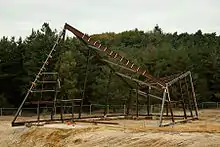Hawley, Hampshire
Hawley is a village in the Hart district of northeastern Hampshire, England.
| Hawley | |
|---|---|
 Hawley Location within Hampshire | |
| OS grid reference | SU8559 |
| • London | 33 miles (53 km) |
| Civil parish | |
| District | |
| Shire county | |
| Region | |
| Country | England |
| Sovereign state | United Kingdom |
| Post town | Camberley |
| Postcode district | GU17 |
| Dialling code | 01252 or 01276 |
| Police | Hampshire |
| Fire | Hampshire |
| Ambulance | South Central |
| UK Parliament | |
| Website | Blackwater and Hawley Town Council |
The village is contiguous with the small town of Blackwater. It is on the western edge of the Blackwater Valley conurbation, about 3 miles (5 km) north of central Farnborough, Hampshire, about 2 miles (3 km) west of Camberley, Surrey and about 33 miles (53 km) west-southwest of London. Hawley is also next to Cove, a large suburban village of Farnborough.
History
The first written record of Hawley is from 1248, in the COMPOTUS DE CRUNDAL,[1] spelt as Halely, Halle and Hallee and later in 1280 as Hallegh. And spelt as Hallie and Halley in the Documents relating to the Foundation of the Chapter of Winchester AD 1541–1547, published by the Hampshire Record Society in 1888 (Pages 69,72 and 87).[2] The name is believed to be derived from Old or Medieval English Healhleah or Healhaleah meaning 'clearing or meadow of the nook(s)'; alternatively 'projecting corner of administrative unit' (Hawley is located close to county boundary with Surrey).[3] Historical spellings also include Hawleye, Halle and Hallie.[4]
The tithings of Yateley and Hawley were listed as parcels of the Manor and Hundred of Crondall in 1567.[3] The Parish of Hawley was created out of the Parish of Yateley in 1838.[5]
Parish church

The Church of England parish church of Holy Trinity[6] built in 1837[7] J.B. Clacy of Reading[8] enlarged the church in 1857.[7] Charles Buckeridge expanded it further in 1863, adding the chancel arch, chancel rib-vaulting and apse.[7] The tower and spire were added in 1882.[7] The building is in a Gothic Revival style of about AD 1300[7] and is listed Grade II (listing 26 June 1987).[9] The parish's daughter church, All Saints', South Hawley is located in Chapel Lane at its junction with Fernhill Road.
Amenities

Hawley has a village hall, village green, equestrian centre, private leisure centre, a cricket ground and a playground area.
Hawley has two schools. Hawley Primary School[10] is a local authority school teaching boys and girls to Key Stages 1 and 2. Hawley Hurst School[11] is an independent day school comprising a mixed nursery, prep and senior school.[12]
Some 2 miles (3 km) southwest of the village is Hawley Lake (via a forest walk about 20 minutes from Hawley Green), which is used by the British Army for basic sailing training and also has a private sailing club & watersports facility (Hawley Lake Sail Training Centre). The lake is used for dinghy sailing, kayaking, windsurfing and wakeboarding/water-skiing. There is also a beach on its southern shore which is used by local residents. Each Guy Fawkes Night the Army organises a firework display on the lake's islets, attracting thousands of visitors from many miles around.
Film location

Hawley Lake and the surrounding woodland is often used as a feature film location, including part of the opening sequence of the 2002 film Die Another Day in which James Bond is in North Korea.[13] It also used for the obstacle course and lake scenes in Spies Like Us, starring Chevy Chase, the 2005 film Sahara[14] and scenes from the second Johnny English film Johnny English Reborn, notably the cable car station.[15] The BBC filmed episodes of It Ain't Half Hot Mum at the lake in the 1970s.[16] In April 2014, the woodland to the east and south of the disused airstrip was used as a filming location for the 2015 superhero movie Avengers: Age of Ultron.[17] Throughout early 2017, sets were built for Jurassic World: Fallen Kingdom in the woodland.
References
- Hampshire Record Society, THE CRONDAL RECORDS – HISTORICAL AND MANORIAL (1891)
- Documents relating to the Foundation of the Chapter of Winchester AD 1541–1547 published by the Hampshire Record Society in 1888 (Pages 69,72 and 87)
- Hawley Historical Rural Settlement Publication
- 'Cove – Old and New' by Maye Watson and L. F. CALLINGHAM (circa. 1925) Page 32 and 45
- Hawley Park and Green Draft Conservation Area Proposal Statement by Hart District Council 2002 Archived 7 January 2009 at the Wayback Machine
- Parish of Hawley, Holy Trinity
- Pevsner & Lloyd, 1967, page 280
- Brodie, Felstead, Franklin & Pinfield, 2001, page 375
- British listed buildings
- Hawley Primary School
- Hawley Place School
- http://www.isi.net/schools/6520/
- https://www.imdb.com/title/tt0246460/locations IMDB incorrectly listing the location as Hawley Hill, Aldershot
- https://www.imdb.com/title/tt0318649/locations
- https://www.imdb.com/title/tt1634122/locations?ref_=tt_dt_dt
- Photograph of the cast of It Ain't Half Hot, Mum at Hawley Lake, June 1980
- https://www.mirror.co.uk/tv/tv-news/avengers-age-ultron-filming-pictures-3395534
Sources
- Brodie, Antonia; Felstead, Alison; Franklin, Jonathan; Pinfield, Leslie; Oldfield, Jane, eds. (2001). Directory of British Architects 1834–1914, A–K. London & New York: Continuum. p. 375. ISBN 0-8264-5513-1.
- Pevsner, Nikolaus; Lloyd, David (1967). Hampshire and the Isle of Wight. The Buildings of England. Harmondsworth: Penguin Books. pp. 280–281.
External links
![]() Media related to Hawley, Hampshire at Wikimedia Commons
Media related to Hawley, Hampshire at Wikimedia Commons
